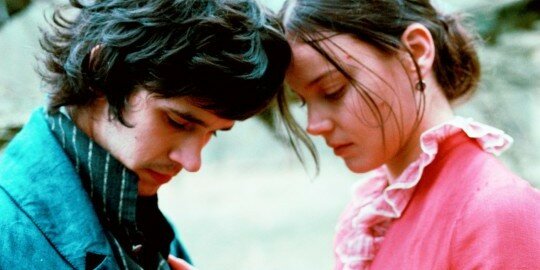Jane Campion’s ninth outing in a directing role conveys all the usual period blend of romance and refinery. Her screenplay for this film remains true to the words of John Keats himself, and ensures her constructed world is a believable portrait of Keats’ life and times.
A sharp chiaroscuro of bright white and dark shadows, Abbie Cornish with persistently tear-stained cheeks and an intense polarisation between the personalities of the Poet John Keats (Ben Wishaw) and his muse Fanny Brawne, adds an interesting twist to the age-old tale of doomed lovers which is fathomed between the shifting seasons of three, nineteenth century years. Keats himself enters the picture as a quasi successful poet, twenty three years of age and still wasting away his days aspiring to be a wordsmith of worth. Beside him in misery and artistic angst is his best friend Charles Armitage Brown, played with the perfect mix of wit and arrogance by Paul Schneider of Lars and the Real Girl fame. As the two gentlemen become acquainted with their neighbours, the Brawnes, eldest daughter Fanny takes a fancy to Keats; whose starving artist chic, belief in his own “negative capability”, two brooding eyes and a clever manipulation of the english language could only be compared with what we in contemporary society have come to know as “Emo”. Que the swoon and collective dreamy sighs from ladies everywhere…
From the get go, Campion promises a film told through subtleties. Like poetry itself, this film presents as a puzzle of words, and what we read between and in the absence of them. While Brown gleefully tries to own Ms. Brawne with his performance making mockery of her disdain for learning the value of poetry and her job as a do-it-yourself seamstress each and every time they meet, Keats is a lot slower to respond to the woman at hand. Effectively, he dangles a carrot to make her chase him and then gets angry when she so much as holds conversation with another male. To make up for this, he later showers Brawne with forest walks, deep love letters and a commitment ring.
A love and mutual respect between the pair grows slowly but surely, and their differences come to compliment their individual views of their world. Most disappointingly, Keats declines to fully commit to Fanny Brawne by avoiding a real job: in paraphrase of this film, using the excuse “but I’m an artist and so I have no money to marry you” is one that many people could still use today, to keep as an effective get-out-of-jail-free-card. In resolution of this film, I was left considering the role of Karma inflicting itself upon Keats – perhaps the TB wouldn’t have killed him if he had just manned up, got a real job and treated his lady the way he kept promising her he would. But that outcome would not have been quite so tragically or poignantly romantic now would it?
![bright_star03[1] bright star031 279x269 custom Bright Star (Review)](/wp-content/uploads/bright_star031-279x269-custom.jpg)
|
Abbie Cornish dominates this film early, even without any of the blonde sass Australian audiences have come to equate her with. Campion has offered the young actress a role that is both challenging and deep, affording a brunette Cornish the room to flex her real acting talent without having to fall back on sex appeal to get her job done well. Despite the hysteria of her character -a natural product of plot- Cornish holds herself well and relays the effects of shock and grief with ease. Given the cheerful nature of Fanny Brawne before she meets John Keats, it is much easier to be more sympathetic towards her and her loss of him rather than towards Keats and his loss of life. This is also accentuated by the fact that he leaves her because his friends “make” him travel to Italy and also, through the modern realisation that most great poets only get famous posthumous; therefore his death was not whole heartedly unexpected. It’s hard not to agree with the “we told you so” looks upon the faces of her family, after Keats messes her around far too many times concluding with his travels to Italy and his untimely death. While the smooth editing propels this story forward and an intricate use of mise-en-scene allow Campion to flesh out her world and the unique characters within, her rhythm is strikingly slow; whether to capitalise upon poignant moments with the clarity of stillness or not, the film sometimes lacks in charge as a result.
After scoring a nomination for the Golden Palm this year in Cannes, it would be easy to think that this film is an endearing and successful effort. Unfortunately this film is drawn out, particularly through the second act where many of Keats’ problems – financially or emotionally related - could be solved if only he stopped brooding about being poor and uninspired and just got on with writing or something else. In some parts, this becomes borderline tedium to watch.
Verdict:
Another Campion classic, told with a natural elegance and beauty. Unfortunately it’s often predictable and boring, although the witty dynamics between Fanny Brawne and Charles Armitage Brown are genuinely funny.
















